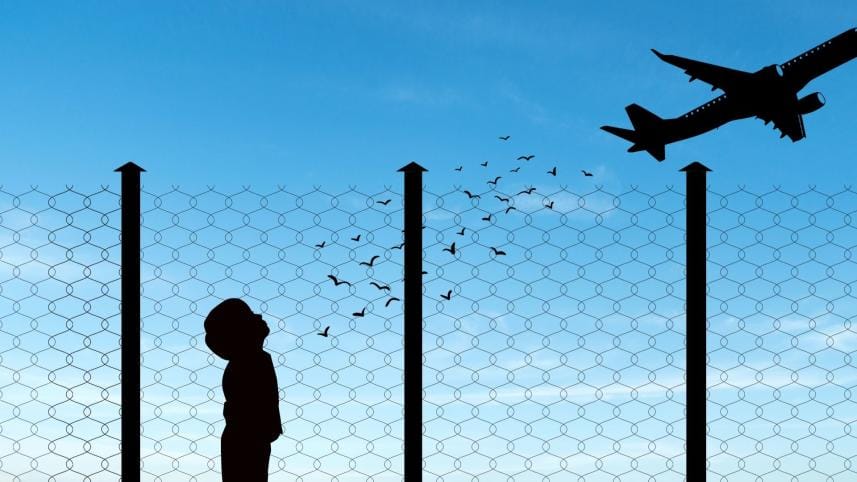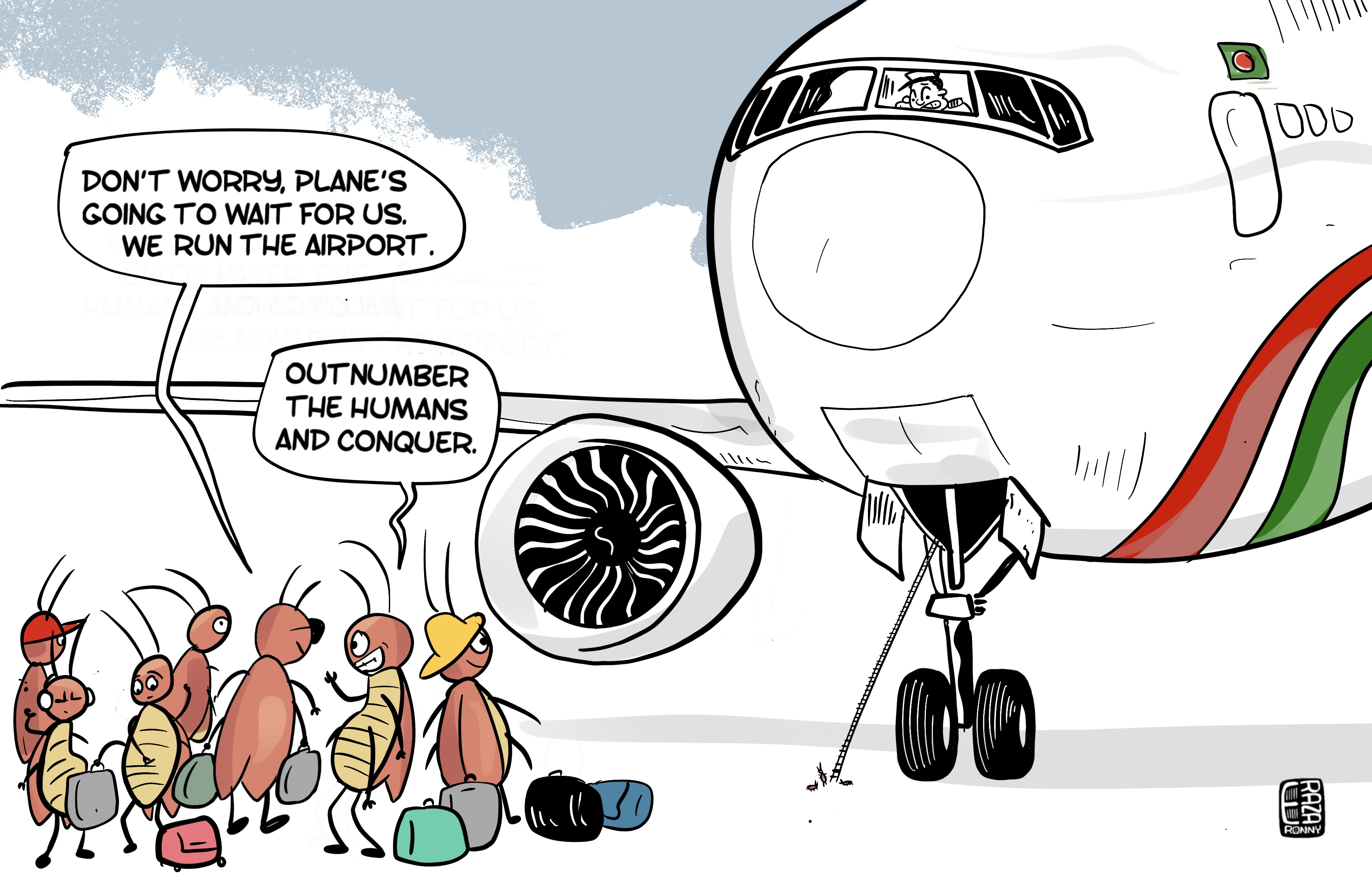Catch me if you can

A pre-teen has been making news for boarding a Kuwait-bound flight from the Dhaka airport without any documentation. He slipped through a number of security checks to get onto an aeroplane that was completely booked. He was only discovered to be an unaccompanied extra passenger during the final headcount, forcing him to be evicted from the aircraft.
The civil aviation authority suspended 10 employees as a result of the security breach that occurred on Tuesday, just hours after the French president left for his country using the same airport. I saw the CCTV footage of the kid sneaking into the airport and confidently and deftly navigating through different barriers while blending in with the neighbouring travelling groups to pass for one of them. He showed a family who were passing through a security check in front of him when he first arrived via the departure terminal gate. Then he hid himself behind several pilgrims to get through at least three layers of immigration screening. Finally, he stayed close to a family with young children to enter the boarding bay. He kept waiting for the right opportunity and learnt to improvise by watching his surroundings.
A local TV news channel interviewed the 12-year-old, who had fled his hometown in Gopalganj around five days earlier and travelled to Dhaka to see a relative in Bashundhara. He admitted that it was only after coming to the airport that he had the sudden impulse to take a ride in one of the aircraft. "It was fun, but it would've been more fun if I could've flown," he confessed. "Flown where?" the interviewer asked. "I don't know," said the boy in a yellow T-shirt with a bicycle on it.
He has the typical characteristics of a boy his age, including big, expressive eyes that sparkle with curiosity, a set of jutting front teeth that seem to have their own growth cycle, and a face that conceals his inner struggles and ambitions with an air of inscrutability. You wouldn't know from the way he acted that his parents were estranged and that they even refused to take him back from the police after the airport incident. His uncle enrolled him in a madrasa, and by this point, the young boy had proven his propensity for getting into mischief of all kinds. Yet, he always made it back home. His family did not inform the police even though he was missing for days.
I've been thinking about several things unrelated to the official probe into airport security. They spring from the image of a runaway child looking for a new life. It brought to mind all the heroic adventurers we encounter in fiction. Why do we admire and approve the adventures of Sarat Chandra's Srikanta, the fictional flight of a young boy in Tagore who wants to be one with a palm tree's leaves, Oliver Twist's escape from a London workhouse and transformation into a stowaway on a ship in Charles Dickens' novel, or Holden Caulfield's escape from boarding school in Pennsylvania in JD Salinger's The Catcher in the Rye? We endorse these imaginative flights and hail them as heroes. Why do we forbid this child from undertaking such a flight, then? Does his attempt to overcome the obstacles not resonate with us?
The psychology of orphans or children in terrible situations who try to elude shelters and go on adventures or dangerous excursions is complex and varies from person to person. With the exception of what I have read or seen in the media, I am unaware of this kid's predicament. Still, I would like to offer some psychological explanations for his behaviour.
He escaped from a madrasa, a place well-known for its strict rules and where students have limited freedom. Running away and going on adventures can help people reclaim their sense of independence and control, because doing so allow them to make decisions for themselves, even if those decisions are risky. We cannot rule out the possibility that a child is subjected to trauma and abuse while attending school or living in a shelter. The adventure might provide an escape from their emotional suffering.
The quest for identification and belonging is frequently the driving force behind adventure writing. Many orphaned or abandoned youngsters have a strong desire to fit in and discover their identity. A person may try to run away in an effort to learn more about who they are, where they are from, or to find a sense of belonging.
The child got on a bus and travelled to the airport. Did he have any unrealistic ideas about the outer world? Did he experience any peer pressure for taking this risk? Perhaps the aeroplane represents a journey from his hard life to somewhere more thrilling, gratifying, or safe. Children are naturally hopeful, in contrast to adults like us who lack motivation. Some people believe that fleeing will lead to a better life or fresh chances. They are able to act in this way because they are unaware of the perils connected to their purported bravery.
The child can be a case study. He has demonstrated extreme tenacity and resourcefulness. We cannot help but wonder at his ability to manoeuvre through difficult circumstances and outwit authorities. His background as a member of a disadvantaged group appeals to our sense of fairness and causes us to support the underdog. For people who feel constrained by conventional rules, he becomes a relatable figure. His experience serves as a testament to the belief that everyone can overcome challenges if they follow their instincts.
The event will force the civil aviation authority to enhance its security measures. I believe we need to pay some extra attention to this incredibly smart and resourceful youngster. With the correct training and guidance, he might someday become our asset abroad! Just watch what they did with Frank Abagnale in Catch Me If You Can, and you will know what I mean. Even a con man with super IQ can become a secret service agent.
Dr Shamsad Mortuza is professor of English at Dhaka University.
Views expressed in this article are the author's own.
Follow The Daily Star Opinion on Facebook for the latest opinions, commentaries and analyses by experts and professionals. To contribute your article or letter to The Daily Star Opinion, see our guidelines for submission.




 For all latest news, follow The Daily Star's Google News channel.
For all latest news, follow The Daily Star's Google News channel. 


Comments